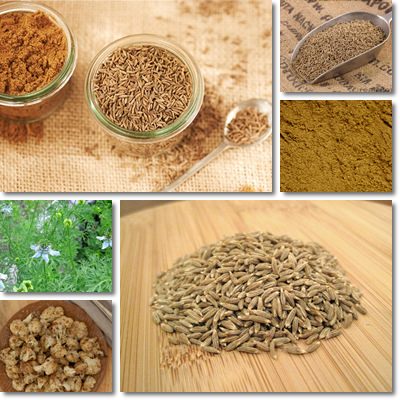Savory and healthy, cumin (Cuminum cyminum) refers to the somewhat crescent-shaped seeds of the plant with the same name. In addition to being rich in antioxidants, cumin possesses excellent antimicrobial properties and is especially recommended for indigestion, flatulence and as an efficient natural remedy for bad breath. The culinary spice is a rich source of iron, copper, zinc and manganese, but also contains generous amounts of B vitamins.
What is cumin and what does it look like?
Cumin refers to both the plant and its beautiful, flavorful, dried seeds used to spice up practically any recipe. Cumin seeds are obtained from the fruit of the plant and look a lot like caraway seeds. More exactly, they are elongated, somewhat crescent-shaped small seeds with numerous tiny ridges. Cumin seeds are yellow and brown in color while ground cumin boasts rich brown-yellowish hues.

What does cumin smell and taste like?
When it comes to spices, both smell and taste are important markers for assessing quality. Cumin seeds, for example, boast a pleasant earthy aroma. Raw cumin tastes somewhat bitter, while dried or cooked cumin assumes a slightly pungent, yet soft, nutty aroma. Roasted and ground cumin has a mildly nutty taste. Overall, the spice is pleasantly flavored, neither too harsh, nor too soft that it lacks flavor altogether. It makes a great spice for salty baked goods such as biscuits and compliments cheese-based preparations but like all spices and herbs, it is best eaten in limited amounts.
What are the benefits of Cumin?
What is cumin good for? See my list of the top 6 nutrition facts and health benefits of cumin:
Great digestion aid
According to research, eating cumin stimulates the production of saliva which softens and moistens food in view of a easier digestion. Saliva also breaks down food stuck between teeth, thus preventing dental plaque and cavities. By preventing tooth decay, cumin helps improve bad breath as well.
Excellent natural carminative
Cumin is known to be an excellent natural carminative, relieving stomach gas in the form of bloating and flatulence and the associated abdominal discomfort. However, it is to be consumed in trace amounts, just like all herbs and spices with medicinal properties.

Rich in antioxidants
If you take a look at the nutrition table above, you will notice that cumin is a rich source of vitamins A and C, B vitamins, copper and manganese, all of which play important anti-inflammatory and antioxidant functions within the human body. Copper and manganese, for example, are cofactors for the superoxide dismutase enzyme, our body’s own natural antioxidant defense system.
Certain aromatic compounds in cumin such a safranal, also found in saffron, exhibit significant antioxidant activity as well, protecting against free radical damage and limiting cancer cell progression in laboratory conditions.
Also see the benefits of saffron. Cuminaldehyde, another aromatic compound, was found to be effective in neurodegenerative diseases such as Parkinson’s and Alzheimer’s.
Helps combat anemia
With 203% of the RDA of iron, cumin represents an extraordinary dietary source of the mineral. Iron is known to support the production of red blood cells which transport oxygen to tissues in muscles and organs and thus ensure their proper oxygenation. Lack of iron in one’s diet will ultimately lead to headaches, shortness of breath, especially when exercising, poor energy levels, muscle cramps, fatigue, all symptoms of anemia. Although cumin is not to be consumed in large amounts, it can still supply a small percentage of iron and contribute to meeting daily requirements.
Anti aging properties
Cumin is rich in nutrients and antioxidants which help slow down the aging process. Copper, for instance, prevents premature hair graying, iris discoloration and age spots, all dreaded signs of premature aging. Manganese is a cofactor for the superoxide dismutase enzyme, exerting a strong antioxidant action – it basically scavenges free radicals from the body and prevents damage to cells.
Natural immunity booster
Cumin is rich in zinc and vitamins A and C, three nutrients of pivotal importance for good immunity, skin and mucous membranes health. However, because consumption is limited to small amounts, one should consider including other immune system boosting foods in one’s diet. Sesame and pumpkin seeds, oats, beef, almonds, ginger and pecan nuts are all great dietary sources of zinc, while sour fruits, citrus fruits, bell peppers are all great sources of vitamin C for boosting immunity.
As is the case with most herbs and spices, cumin too is rich in volatile (or essential) oils, namely cuminaldehyde, carveol, carvone, limonene, pinene, thujone, safranal and so on. Volatile oils are not only aromatic compounds that give herbs their particular flavors, but also boast strong antimicrobial, anti-inflammatory and antioxidant properties and contribute to the health effects of the herb they are found in.
Conclusion
All in all, cumin is a positively healthy spice with a variety of health benefits. And although we consume it in such small amounts, it is a valuable asset to our diet due to its excellent nutritional profile. A teaspoon of this spice, a pinch of another and so on can significantly improve any diet and possibly make a great difference in point of wellness.
